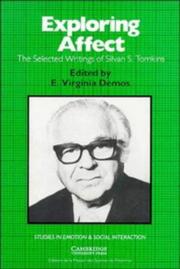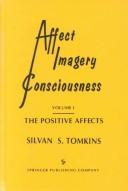| Listing 1 - 10 of 20 | << page >> |
Sort by
|
Book
Abstract | Keywords | Export | Availability | Bookmark
 Loading...
Loading...Choose an application
- Reference Manager
- EndNote
- RefWorks (Direct export to RefWorks)

ISBN: 0511663994 0521443717 0521448328 Year: 1995 Publisher: Cambridge : Cambridge University Press,
Abstract | Keywords | Export | Availability | Bookmark
 Loading...
Loading...Choose an application
- Reference Manager
- EndNote
- RefWorks (Direct export to RefWorks)
Silvan Tomkins was one of the most influential theorists on emotion and emotional expression. Over a period of 40 - some years - until his death in 1991 - he developed a set of original, important ideas about the nature of affect and its relationship to cognition and personality. Tomkins dealt with fundamental questions in a fresh and provocative way, establishing affect as a separate, biological system, and providing compelling data on discrete affect expressions. Several years before his death, Professor Tomkins agreed to bring his papers (unpublished and published) together into Exploring Affect for Cambridge Studies in Emotion and Social Interaction. He worked with Paul Ekman and Klaus Scherer to develop a structure for the book that would synthesize his theory of emotion. Unfortunately, he died before he was able to complete the process. Virginia Demos, who knew Professor Tomkins well, took on the enormous task of compiling the papers and writing connective material for the book. This volume of Tomkins selected writings on affect brings together his works of four decades and makes them available at a more receptive time in the field. It is a treasure trove of provocative, insightful and relevant ideas.
Affect (Psychology) --- Emotions --- Psychology --- Tomkins, Silvan S. --- Health Sciences --- Psychiatry & Psychology
Book
Abstract | Keywords | Export | Availability | Bookmark
 Loading...
Loading...Choose an application
- Reference Manager
- EndNote
- RefWorks (Direct export to RefWorks)
Book
Year: 1965 Publisher: New York (N.Y.): Grune and Stratton
Abstract | Keywords | Export | Availability | Bookmark
 Loading...
Loading...Choose an application
- Reference Manager
- EndNote
- RefWorks (Direct export to RefWorks)
Book
Abstract | Keywords | Export | Availability | Bookmark
 Loading...
Loading...Choose an application
- Reference Manager
- EndNote
- RefWorks (Direct export to RefWorks)
Book
Abstract | Keywords | Export | Availability | Bookmark
 Loading...
Loading...Choose an application
- Reference Manager
- EndNote
- RefWorks (Direct export to RefWorks)
Book
Abstract | Keywords | Export | Availability | Bookmark
 Loading...
Loading...Choose an application
- Reference Manager
- EndNote
- RefWorks (Direct export to RefWorks)
Book
Abstract | Keywords | Export | Availability | Bookmark
 Loading...
Loading...Choose an application
- Reference Manager
- EndNote
- RefWorks (Direct export to RefWorks)
Book
Year: 1947 Publisher: New York : Grune & Stratton,
Abstract | Keywords | Export | Availability | Bookmark
 Loading...
Loading...Choose an application
- Reference Manager
- EndNote
- RefWorks (Direct export to RefWorks)
"This is a book about a test which is barely fifteen years old--a promising adolescent emerging from the rites of puberty. The Thematic Apperception Test (TAT) has not yet attained full stature, that is certain, and perhaps this book should have awaited its further development. It is with the hope that the maturation of the test might be accelerated that I venture to publish a series of lectures delivered to a seminar on the diagnosis of personality. Many of the characteristics of lectures will be found in these pages--more questions are asked than answered, hypotheses are illustrated more than proven, much that might have been mentioned briefly is laboriously illustrated, and what might have been elaborated is expressed obliquely. It is a workbook and not a compilation of established doctrine. I have addressed myself to two audiences: those who are completely unfamiliar with the TAT and research psychologists whose interest I hoped to enlist in the exploration of a host of problems-problems of test interpretation which are also of import for the science of which the test is a constituent element. Because of these aims, the psychologist who is long familiar with the technique of interpretation and whose interests are primarily diagnostic may find too much that is well known and too much that is remote from his immediate clinical concern"--Preface. (PsycINFO Database Record (c) 2006 APA, all rights reserved).

ISBN: 0826105416 Year: 1992 Publisher: New York : Springer Publishing Co,
Abstract | Keywords | Export | Availability | Bookmark
 Loading...
Loading...Choose an application
- Reference Manager
- EndNote
- RefWorks (Direct export to RefWorks)
"This book discusses affect theory. It is not primarily focused on what is current knowledge. I have sought to explore new territory. It is my intention to reopen issues which have long remained in disrepute in American Psychology: affect, imagery and consciousness. These have lately come to interest neurophysiologists and biochemists more than psychologists. This book explores positive affect, negative affect, and cognition and ideology"--Create. (PsycINFO Database Record (c) 2013 APA, all rights reserved).
| Listing 1 - 10 of 20 | << page >> |
Sort by
|

 Search
Search Feedback
Feedback About UniCat
About UniCat  Help
Help News
News